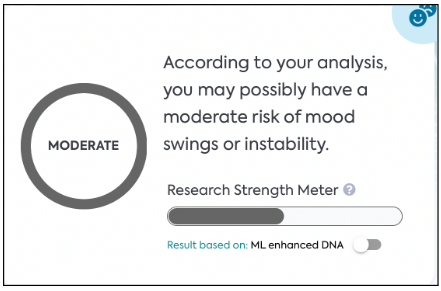Demystifying The Complex Genetics of Mood Swings
harvey
on
April 25, 2024

Latest Posts
Table of Contents
Demystifying The Complex Genetics of Mood Swings
Date of Content: April 19, 2024
Written by: Avanthika Nityanand
Reviewed by: Maarit Tiirikainen, PhD
Disclaimer: This article is meant for information purposes only. LifeDNA does not offer clinical diagnoses for any conditions discussed herein or otherwise.
What Are Mood Swings?
Mood swings or Mood Instability refer to rapid and often intense changes in one’s emotional state. This phenomenon can see an individual fluctuating between happiness, sadness, irritability, or anger with little to no apparent reason. Unlike the regular ebb and flow of emotions experienced by most people, mood swings can be severe, sudden, and seemingly unprovoked. They can impact an individual’s ability to function in daily life, affecting relationships, work performance, and overall well-being.
Mood swings can range from minor fluctuations in temperament to significant shifts that might indicate underlying psychological or medical issues. Understanding mood swings involves recognizing their frequency, intensity, and impact on life and identifying patterns that may suggest specific triggers or underlying causes.

What Causes Mood Swings?
A variety of factors, both psychological and physiological, can cause mood swings. Psychological causes include stress, anxiety, and mental health disorders such as bipolar disorder, depression, and personality disorders.
Physiologically, hormonal imbalances play a significant role, especially those related to menstrual cycles, pregnancy, and menopause in women, as well as thyroid disorders and other endocrine system disturbances. Lifestyle factors such as diet, exercise, sleep patterns, and substance use also significantly influence mood regulation.
Additionally, certain medications and medical conditions can lead to mood swings as side effects or symptoms. It is important to note that the specific causes of mood swings can vary greatly from person to person, and a multifaceted approach considering both psychological and physiological factors is often necessary to understand and address them effectively.
Read our full analysis of the Genetics of Depression
Genetics of Mood Swings
Several genes have been shown to have varying influences on mood swings. A few of them are discussed below:
DRD2
The DRD2 gene is associated with the dopamine receptor D2, a component of the dopamine system in the brain. Dopamine is a neurotransmitter that plays a significant role in regulating mood, motivation, reward, and the pleasure centers of the brain. Variations in the DRD2 genehave been studied for their potential impact on mood swings and other psychiatric conditions because they influence dopamine signaling. One particular variant (rs12420205) has been significantly associated with mood swings.
SORCS3
The SORCS3 gene (Sortilin-Related VPS10 Domain Containing Receptor 3) is increasingly recognized in neuroscience and psychiatric research for its potential role in mood regulation. The SORCS3 gene encodes a protein that is part of the VPS10 domain receptor family, which is involved in neuronal development and the regulation of neurotrophic factors. These receptors play a critical role in the central nervous system, influencing synaptic plasticity, neurotransmitter signaling, and neuron survival, all essential for proper brain function and mental health.
Research has indicated that genetic variations (e.g. rs11599236) in the SORCS3 gene may be linked to susceptibility to mood instability.
DCC
DCC netrin 1 receptor gene (DCC), is fascinating because this very large gene is situated in a region where no other protein-coding genes are found within a 500 kb radius. DCC plays a crucial role in the development of the nervous system, notably affecting the organization and functionality of mesocorticolimbic dopamine systems, which are vital for emotional regulation and mood.
According to a 2017 genome-wide association study (GWAS), variations in the DCC gene (like rs8084280, rs34160346 & rs11877496) may increase susceptibility to mood instability, mood disorders, and related psychological conditions, making it a gene of significant interest in the study of these disorders.
PLCL1
The PLCL1 gene, which stands for Phospholipase C Like 1, has been investigated in various psychological and neurological conditions. Earlier GWASs have connected this gene with schizophrenia and bipolar disorder. Genetic variations in this gene, like rs9857592 and rs12477961, have been found to influence mood stability.
NEGR1
The NEGR1 (Neuronal Growth Regulator 1) gene is involved in neuronal growth and brain development. It encodes a protein that is part of the immunoglobulin superfamily and is located on the cell surface of neurons. NEGR1 plays a significant role in neurodevelopment and is thought to be involved in cell adhesion processes critical for forming and maintaining neuronal networks.
Genetic variations in this gene, such as rs2000228, have been shown to influence mood instability.
Non-Genetic Factors Influencing Mood Swings
Non-genetic factors that influence mood swings encompass various environmental, psychological, and physiological elements. These factors can interact with each other and with genetic predispositions to affect mood stability.
Understanding these can be crucial for managing mood swings and developing appropriate intervention strategies. Here’s a look at some key non-genetic factors:
1. Psychological Stress
High stress levels from personal, professional, or social challenges can significantly contribute to mood swings. Stressful life events, such as the loss of a loved one, financial problems, or relationship issues, can trigger emotional instability.
2. Sleep Patterns
Poor sleep quality or sleep disorders like insomnia can profoundly impact mood regulation. Lack of sleep can exacerbate irritability, anxiety, and depression, leading to more pronounced mood swings.
3. Diet and Nutrition
Diet plays a crucial role in mood regulation. Nutritional deficiencies (e.g., low omega-3 fatty acids, vitamin D) can contribute to mood instability. Conversely, a balanced diet can support a stable mood.
4. Substance Use
The use of alcohol, drugs, and even caffeine can influence mood swings. Substances that affect the central nervous system can lead to temporary mood elevation followed by a crash, contributing to mood instability.
5. Hormonal Changes
Hormones have a significant impact on mood. Fluctuations related to menstrual cycles, pregnancy, thyroid disorders, or menopause can cause mood swings. For example, conditions like Premenstrual Syndrome (PMS) or Premenstrual Dysphoric Disorder (PMDD) are directly linked to hormonal changes and mood swings.
6. Physical Health Conditions
Chronic physical health conditions, such as chronic pain, diabetes, heart disease, or neurological disorders, can contribute to depression and anxiety, leading to mood swings.
7. Medications
Some medications can affect mood as a side effect. For example, steroids are known to cause mood swings in some individuals. Always consult healthcare providers about potential mood-related side effects of any medication.
8. Environmental Factors
Changes in season or weather (e.g., Seasonal Affective Disorder), exposure to toxins, and other environmental factors can influence mood and emotional well-being.
9. Social Support and Relationships
The quality of one’s social relationships and the degree of social support can influence emotional stability. Isolation or conflict-ridden relationships can lead to stress and mood swings.
10. Psychological Disorders
While not purely non-genetic (given the genetic component of many psychological disorders), conditions like bipolar disorder, depression, and anxiety disorders are characterized by significant mood swings. Therapy and medication are often required to manage these conditions.
Recognizing and addressing these non-genetic factors can be essential for individuals experiencing mood swings. Lifestyle adjustments, stress management techniques, therapy, and, in some cases, medication, can help manage these influences and support mood stability.
When Do Mood Swings Start In Pregnancy?
Around one in eight women experience depression or anxiety during pregnancy. These emotional fluctuations are primarily attributed to hormonal changes, particularly increases in estrogen and progesterone, which can affect neurotransmitter levels in the brain, impacting mood regulation.
Additionally, the physical discomforts of pregnancy, concerns about childbirth, and the impending responsibilities of parenting can contribute to stress and anxiety, further exacerbating mood swings. Each woman’s experience is unique, but common triggers include fatigue, physical changes, and the emotional stress of preparing for a new life stage. Understanding that these mood swings are a normal part of pregnancy for many women can help manage expectations and reduce stress.
How Do You Control Mood Swings During Periods?
The menstrual cycle is a monthly process that the female body goes through to prepare for the possibility of pregnancy, involving the release of an egg for fertilization (ovulation) and the shedding of the uterine lining if pregnancy doesn’t occur. The term “periods” refers specifically to the latter part.
Controlling mood swings during periods involves a holistic approach focusing on lifestyle, dietary, and stress-management strategies. Regular exercise can help stabilize mood, as physical activity increases endorphins, improving overall emotional well-being.
A balanced diet that limits caffeine, sugar, and alcohol while being rich in fruits, vegetables, and whole grains can also support mood stability. Ensuring adequate sleep and practicing relaxation techniques such as mindfulness or meditation can further aid in managing stress and emotional fluctuations.
How Do You Control Mood Swings During Ovulation?
Ovulation is the phase in a woman’s menstrual cycle when a mature egg is released from the ovary into the fallopian tube, making it available for fertilization. Hormonal fluctuations, involving estrogen, progesterone, and luteinizing hormone, have been attributed to mood swings.
Controlling mood swings during ovulation involves a combination of lifestyle adjustments, stress management techniques, and sometimes medical intervention. Regular exercise, a balanced diet rich in nutrients, and sufficient sleep can significantly improve emotional regulation. Stress-reduction techniques such as meditation, yoga, and deep-breathing exercises can also help.
Tracking ovulation and being aware of the timing can prepare individuals to anticipate and manage mood swings more effectively. For some, over-the-counter pain relievers or birth control pills (under a doctor’s guidance) can help balance hormones and mitigate mood swings. It’s crucial to prioritize self-care and, if mood swings are severe or persist, to consult with a healthcare provider for personalized advice and treatment options.
How Do You Deal With Prednisone Mood Swings?
Prednisone is a type of corticosteroid medication that was commonly prescribed to reduce inflammation and suppress the immune system. It’s used to treat a variety of conditions, including asthma, allergic reactions, skin diseases, arthritis, lupus, multiple sclerosis, and certain types of cancer. While effective, it can also have a range of side effects, such as increased susceptibility to infection, mood swings, weight gain, and high blood pressure, especially with long-term use.
Dealing with prednisone-induced mood swings requires understanding that these are a side effect of the medication and may not always be fully preventable. Communicating openly with healthcare providers about side effects is crucial, as they may adjust the dose or suggest alternatives. Implementing strategies to manage stress, such as regular physical activity, relaxation techniques, and ensuring a supportive environment, can mitigate some emotional instability.
Takeaway
Individuals with mood swings or mood instability can fluctuate between happiness, sadness, irritability, or anger with little to no apparent reason. Mood swings can be influenced by both genetic and non-genetic factors. Maintaining a healthy lifestyle, with a balanced diet and adequate sleep, supports overall well-being, potentially reducing the severity of mood swings.
It’s also beneficial to inform friends and family about potential mood changes to foster understanding and support. If mood swings become severe or unmanageable, seeking professional medical advice is essential for adjusting treatment plans and exploring additional interventions.
LifeDNA’s Personality & Cognition Report
The LifeDNA Personality Report offers intriguing insights into how your genetics might influence your behavior, emotions, and social interactions. Based on genetic markers associated with personality traits such as introversion, extroversion, and emotional resilience, the report provides a detailed analysis to help you understand yourself better. Knowing your genetic predispositions can guide personal development, optimize relationships, and enhance career satisfaction.
The report also covers an analysis of your genetic susceptibility to Mood Swings. Get your report here.

References
- https://my.clevelandclinic.org/health/symptoms/mood-swings
- https://www.ncbi.nlm.nih.gov/pmc/articles/PMC6193004/
- https://www.nature.com/articles/s41467-018-03242-8/tables/1
- https://www.nature.com/articles/s41398-017-0012-7
- https://doi.org/10.1038/s41380-019-0439-8
- https://www.ncbi.nlm.nih.gov/pmc/articles/pmid/25056061/
- https://academic.oup.com/hmg/article/15/12/1949/2355876#85537001
- https://journals.lww.com/nursingmadeincrediblyeasy/fulltext/2021/01000/mental_status_changes_with_corticosteroid_therapy.11.aspx#:~:text=Excessive%20amounts%20of%20corticosteroids%20can,BP%2C%20trembling%2C%20and%20anxiety.
- https://www.nct.org.uk/pregnancy/how-you-might-be-feeling/emotions-during-pregnancy#:~:text=Pregnancy%20can%20be%20a%20time,anxiety%20when%20they%27re%20pregnant%20.
- https://www.health.com/ovulation-symptoms-7561616#:~:text=You%20may%20notice%20mood%20swings,(LH)%2C%20and%20progesterone.
- https://www.ncbi.nlm.nih.gov/books/NBK534809/
Customer Reviews




*Understanding your genetics can offer valuable insights into your well-being, but it is not deterministic. Your traits can be influenced by the complex interplay involving nature, lifestyle, family history, and others.
Our reports have not been evaluated by the Food and Drug Administration. The contents on our website and our reports are for informational purposes only, and are not intended to diagnose any medical condition, replace the advice of a healthcare professional, or provide any medical advice, diagnosis, or treatment. Consult with a healthcare professional before making any major lifestyle changes or if you have any other concerns about your results. The testimonials featured may have used more than one LifeDNA or LifeDNA vendors’ product or reports.
- Category: Personality & Cognition



